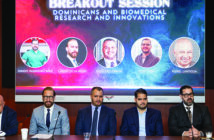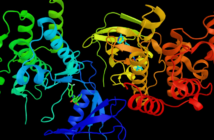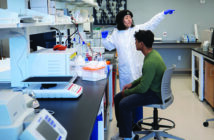Can progesterone protect the brain after injury?
Lisa H. Merck, MD, MPH, is an assistant professor of emergency medicine and diagnostic imaging and director of the Division of Emergency Neurosciences in the Department of Emergency Medicine. Her research focuses on neurological emergencies, such as traumatic brain injury.
TBI affects 1.7 million people a year, causing 50,000 deaths and costing $76 billion in health care annually. Merck was an investigator in a large NIH-funded trial, ProTECT III, and co-authored the resulting study published in the New England Journal of Medicine in December 2014. The randomized, placebo-controlled trial evaluated the use of IV progesterone to treat patients with moderate to severe TBI and involved 881 patients at 49 trauma centers. The trial was stopped early because preliminary analyses did not show a significant difference between progesterone and placebo in clinical outcome at six months after the injury.
As an emergency room physician, how important is it for you to find new methods to treat TBI?
In the acute phase of brain injury, time is critical to patient outcome; maintaining adequate cerebral perfusion pressure and triaging patients for surgical intervention are vital to the care of these patients. Identifying new and effective treatments in the constellation of injuries associated with TBI is essential to improving care.
What is unique about the physiology of progesterone and the brain?
My collaborator, Donald Stein, PhD, of Emory University, one of the leading experts on this topic, describes progesterone as unique because in addition to anti-inflammatory properties, research studies have shown that it is also neurotrophic— it upregulates the genes that make factors that rescue neurons from necrosis and apoptosis-induced cell death. In preclinical studies progesterone has shown substantial promise in treating stroke, diabetic neuropathy, optic nerve injury, and some animal models of ALS.
Why do you think your study of progesterone to treat TBI did not show a benefit over placebo?
When we started ProTECT III, there were more than 200 previous studies showing that progesterone does have a neuroprotective effect in brain injury in animal models, and so it was certainly disappointing to get to the phase III trial in humans and not have significant results in the primary analysis. We are now completing the secondary analyses, developing regression models to measure the confounders implicit in human data (such as polytrauma events, comorbidities, and pathophysiology). I am hopeful that this will provide us with more insight into the relationship between progesterone and outcome.
Do you think progesterone does work to treat TBI ?
Yes. I don’t think that the initial analysis closes the door on progesterone. I think it is a huge setback because this was a massive undertaking. However, there is much work left to do.
What was one unforeseen and immediate benefit of the ProTECT III study?
In order to successfully treat TBI across multiple study centers, we developed standardized physiologic goals of therapy and essentially brought neurointensive care into the emergency room. We worked very closely within our teams of neurointensivists, trauma surgeons, neurosurgeons, emergency doctors, and emergency medical services personnel. From the moment the patient arrived in the emergency department through their tenure in the ICU and visits to the operating room, there was a coordinated effort to maintain specific physiologic goals of therapy. In the ProTECT III trial, the mortality rate for both groups of patients, progesterone and placebo, was among the lowest mortality rates reported in TBI trials. These standardization guidelines have now been adapted by the American College of Surgeons and will be distributed to all trauma centers in the country. It is my opinion that the way that this study was conducted transformed TBI care across the country at academic medical centers.



